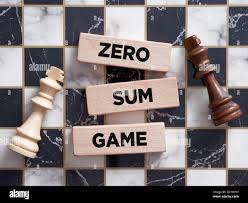0 Sum Game, is a type of game in which the total utility (or benefit) remains constant. In other words, the sum of gains and losses among participants equals zero. If one player benefits, another player must incur an equivalent loss. This creates a competitive environment where participants are pitted against each other, often leading to a win-lose scenario.
Key Characteristics
- Fixed Resources: In a zero-sum game, the resources available are fixed. This means that the total payoff is constant, leading to a direct conflict of interest among players.
- Direct Competition: Players in a zero-sum game are in direct competition, where one player’s success is inherently tied to another’s failure. This dynamic encourages strategic thinking and often results in adversarial tactics.
- Predictable Outcomes: Because of the competitive nature of zero-sum games, the outcomes can often be predicted through strategic analysis. Players can use mathematical models to determine optimal strategies.
Examples of Zero-Sum Games
- Poker: In poker, the amount of money won by one player is equal to the amount lost by others. The total money in the pot remains the same, making it a classic example of a zero-sum game.
- Chess: A chess match between two players is a zero-sum game. The winner gains a victory, while the loser faces defeat. The outcome of one player’s success is a direct loss for the other.
- Market Competition: In certain economic scenarios, such as market share battles between two companies, gaining market share by one company often results in a loss of market share for the competitor.
Implications of Zero-Sum Games
- Strategic Decision-Making: Understanding zero-sum games can aid in strategic decision-making. Players must consider not only their moves but also anticipate their opponent’s strategies, leading to more calculated approaches.
- Conflict Resolution: In political and diplomatic contexts, recognizing zero-sum scenarios can help negotiators identify areas of conflict and work towards solutions that might transform the situation into a win-win outcome.
- Economic Analysis: Economists often use zero-sum game theory to analyze competitive markets, helping businesses strategize effectively to gain advantages over their rivals.
Critiques and Limitations
While the concept of zero-sum games provides valuable insights, it has its limitations. Many real-world interactions are not strictly zero-sum; they can be positive-sum (where all parties benefit) or negative-sum (where all parties lose). Over-reliance on zero-sum thinking can lead to overly competitive mindsets, hindering collaboration and cooperative solutions.
Conclusion
Zero-sum games are a fundamental concept in game theory, illustrating the competitive nature of certain interactions. By understanding the dynamics of these games, individuals and organizations can develop better strategies for negotiation, competition, and conflict resolution. While they provide a useful framework for analysis, it is important to recognize the broader spectrum of interactions that exist beyond zero-sum scenarios, fostering a more collaborative and constructive approach to problem-solving.




